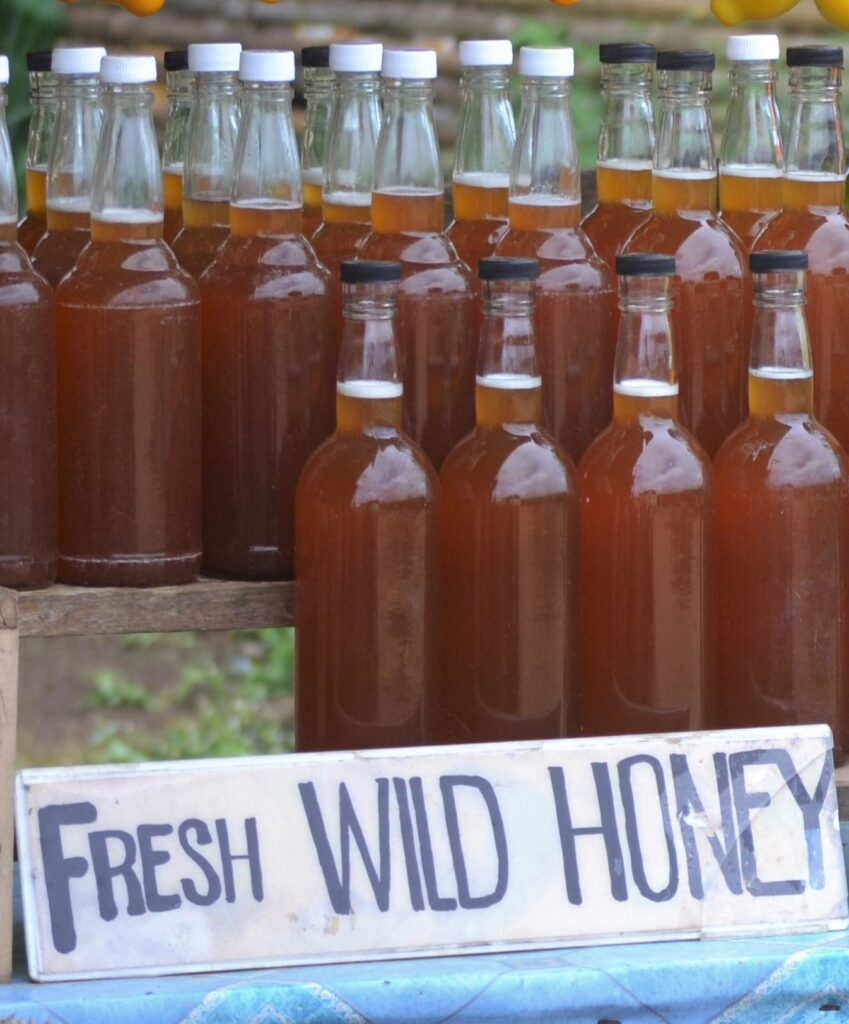Text and Photos by Henrylito D. Tacio
“Honey is a treat, and is man’s oldest sweetener,” someone once wrote. “It is an excellent substitute for sugar in our drinks and food. It is also good for many medicinal uses and treating certain conditions.”
For at least 2700 years, honey has been used to treat a variety of ailments. Evidence from Stone Age paintings showed bee products as honey had been used as treatment of disease. Ancient scrolls, Egyptian papyri, Hindi scripture, Holy Koran, and the Bible illustrated that honey had been widely used as a drug.
But it’s only in recent years that scientists around the world have been investigating the use of honey in modern medicine.


The honey research unit of the University of Waikato in Hamilton, New Zealand, for instance, has found that honey kills a wide range of bacteria. Part of honey’s antibacterial activity can be explained by what’s known as an “osmotic” or “water-withdrawing” effect. Honey reportedly has a density of about 1.36 kilogram per liter (that’s 40% denser than water!).
”Honey has very little water – that’s what makes it thick and gooey – whereas bacteria are made mostly of water,” explained Dr. Peter Molan, professor of biological sciences and the unit’s director. “So, when certain kinds of bacteria come into contact with honey, the honey basically sucks the water out of the bacteria like a sponge, and the bacteria die.”
During the pandemic, health experts are urging people to strengthen their immune system. Honey is one of those foods that can help as it is an “immune system builder,” according to research done by Michigan State University.
The flavonoids and polyphenols found in honey act as antioxidants that “protect the structural integrity of cells and tissues and have the ability to neutralize free radicals, preventing damage to immune cells.”
Honey, a natural product formed from nectar of flowers by honeybees, is composed of sugars like glucose and fructose and contains vitamins B1, B2, C, B6, B5 and B3. Several kinds of hormones are also present in the thick, sticky sweet liquid.
“Approximately 31 variable minerals have been found in honey, including all of the major minerals such as phosphorus, sodium, calcium, potassium, sulfur, magnesium, and chlorine,” states a review of recent clinical research on honey and health published in Pharmacognosy Research. It adds that many essential trace components are detected in honey.
The review paper said that, traditionally, honey is used in the treatment of eye diseases, bronchial asthma, throat infections, tuberculosis, thirst, hiccups, fatigue, dizziness, hepatitis, constipation, worm infestation, piles, eczema, healing of ulcers, and wounds and used as a nutritious supplement.
The body of Alexander the Great is said to have been preserved in honey. John the Baptist lived for a long period of time in the wilderness on a diet consisting of locusts and wild honey (Matthew 3:4).
All these health benefits could be obtained if you use pure honey. Unfortunately, the honey you buy from groceries, souvenir shops and online platforms may be fake honey. They may be sweet but they’re not pure.
Researchers from the Department of Science and Technology-Philippine Nuclear Research Institute (DOST-PNRI) said that about 80% of those marketed honey products are not pure honey but sugar syrup.
In the PNRI study using the nuclear-based tests, they found out that those honey products sold in the local market actually contain syrups made from sugar cane and corn. This fraudulent practice allows manufacturers to increase the volume of their products while reducing the production costs.
Of the 76 honey brands that were studied, 62 of them were found to be adulterated; they were composed of 95% C4 sugar syrup. “So, they are not actually adulterated but they are just completely purely sugar syrup,” pointed out DOST-PNRI Dr. Angel T. Bautista VII.
According to Dr. Bautista, 12 out of 16 (75%) local honey brands sold either in groceries or souvenir shops are not entirely honey. In addition, a staggering 87% or 64 out of 74 of local honey products sold online are impure.
What is even more alarming is that of 41 imported honey products being marketed in local stores, “none of them were found to be adulterated.”
“The problem is that people are being tricked,” Dr. Bautista said. “You may be buying honey for its wonderful health benefits, but because of adulteration, you may actually just be buying pure sugar syrup. Consuming too much pure sugar syrup can lead to harmful health effects.”
Dr. Bautista and his team have already forwarded their findings to the Department of Agriculture and the Food and Drug Administration.
“If we just release the names of the companies, they may stop for a while. But no one can stop them from faking honey again in the future. If we incorporate these isotope-based standards into our regulatory system and the Philippine National Standards, then we think it will be a long-lasting solution to this problem,” Dr. Bautista believed.
They also call for stricter policies, regulation, and control measures to protect the honey industry and buyers.
Honey is one of the most common food items being sold throughout the world. While its demand can make honey farming a promising business, it has also become a subject of fraudulent production.
That’s why it is advisable to buy honey products from reputable sources. If there are bee farms in your area, it’s much better to buy from them.
Beekeeping in the Philippines started in the 1930s. However, honeybees did not catch the attention of many people then as beekeeping was considered unprofitable; the few people that went into it did it as a hobby. Sometimes in the 1970s, beekeeping became a fad and more people became interested.
Today, honeybees are raised for profit in backyards in Cavite, Batangas, Laguna, Quezon, and in the Visayas, and as far as Davao in Mindanao.








